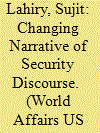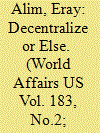|
|
|
Sort Order |
|
|
|
Items / Page
|
|
|
|
|
|
|
| Srl | Item |
| 1 |
ID:
176213


|
|
|
|
|
| Summary/Abstract |
Much recent literature has examined the correlates of anti-vaccination beliefs, without specifying the mechanism that creates adherence to these debunked ideas. We posit that anti-vaccination beliefs are an outcome of a general psychological propensity to believe in conspiracies based on new research on the interconnectedness of conspiracy beliefs. These ideas are tested with a confirmatory factor analysis and a seemingly unrelated regression (SUR) model of a nationally representative U.S. sample from the 2016 American National Election Studies. The confirmatory factor analysis shows that anti-vaccination beliefs highly correlate with belief in the unrelated conspiracies that Obama is a Muslim and 9/11 trutherism. Our SUR models also show that all three of these very different beliefs have similar predictors. All three have a negative correlation with political trust, political knowledge, education, and a positive correlation with authoritarianism. Thus, anti-vaccination beliefs are shown to be part of a psychological propensity to believe in conspiracies
|
|
|
|
|
|
|
|
|
|
|
|
|
|
|
|
| 2 |
ID:
176216


|
|
|
|
|
| Summary/Abstract |
Security discourse has radically changed over the years, especially since the Post–Cold War period. The traditional concept focuses on state security and national security, and is essentially based on realist and neo-realist paradigms. However, in 1994, the United Nations Human Development Report for the first time elaborated the notion of human security and the associated Human Development Index (HDI). Human security advocates a people-centric approach to security. The two foundational principles on which human security is based are “freedom from fear” and “freedom from want.” I evaluate the notions of state security versus human security and examine how South Asian countries have fared regarding the human security indices. I conclude that, despite advances in some areas, various HDI parameters show that the human security record is still rather dismal in South Asia. There remains a critical need to improve it.
|
|
|
|
|
|
|
|
|
|
|
|
|
|
|
|
| 3 |
ID:
176215


|
|
|
|
|
| Summary/Abstract |
Drawing on the concept of offensive coercive diplomacy, this article examines Russia’s strategy in the conflict in Eastern Ukraine and addresses the question of why Russia has failed to achieve its objectives. Through an analysis of notions such as “status quo” (in terms of who overturned it) and international law (in terms of who violated it), I attempt to show that Russia’s actions in Eastern Ukraine qualify as offensive coercion. Backed up by force, Russia demanded that Ukraine implement a decentralization process and grant a part of Eastern Ukraine (Donbas) special status. Knowing that Russia’s aim is to use Donbas as an instrument to control its political future, Ukraine refused to acquiesce to Russia’s demand without restoring its sovereignty in Eastern Ukraine. With both sides refusing to budge, the crisis turned into a zero-sum game. This article seeks to contribute to research on coercive diplomacy by focusing on offensive coercion.
|
|
|
|
|
|
|
|
|
|
|
|
|
|
|
|
| 4 |
ID:
176212


|
|
|
|
|
| Summary/Abstract |
At the time I am writing, we are witnessing unparalleled global uncertainty; social distancing; health system overload; rampant negative media sensationalism; enforced lockdown in Europe, the United States, and many other regions; and lasting economic upheaval across the world as a result of the rapid global spread of COVID-19, the novel coronavirus. There is a slim possibility that, by the time this issue of the journal goes to press, the immediate situation may have relaxed a very little in Europe, the United States, and elsewhere, as it appears to have done in Wuhan, China, where the virus originated. But projections indicate more than a little relaxation is extremely unlikely in the West, and unthinkable in other regions that have yet to face the worst onslaught—often with far fewer resources and woefully inadequate infrastructure. If lockdowns are relaxed, we can expect a series of waves of new infections in consequence for months to come—mitigated only by the hoped-for success of leveling-out strategies to alleviate, periodically, the pressure on our overburdened health systems and their tireless, courageous employees.
|
|
|
|
|
|
|
|
|
|
|
|
|
|
|
|
| 5 |
ID:
176214


|
|
|
|
|
| Summary/Abstract |
Do populists pursue distinct kinds of policies, and if so, how successful are those policies? Populist rhetoric often invokes themes of redistribution insofar as leaders claim that power and resources need to be restored to “the people.” As a result, populists tend to offer a very broad view of social policy that emphasizes security, order, rewards, and punishments. Populists’ narratives may be simple, but once in office, they may face complex problems that call for more sophisticated policy solutions. This study examines whether populist policies fit the messages they deliver to their target voters, and aims to contribute to the development of a methodology for determining that relationship in specific empirical cases. I focus on the case of Russia, which enacted a major change in its old-age pension system in 2018 under the leadership of President Vladimir Putin.
|
|
|
|
|
|
|
|
|
|
|
|
|
|
|
|
|
|
|
|
|